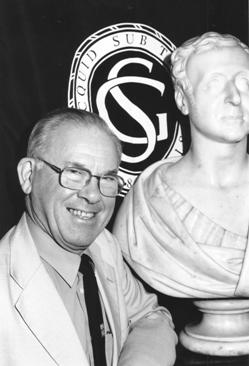 Father of organic petrology, distinguished academic leader and society officer
Father of organic petrology, distinguished academic leader and society officer
Professor Duncan Murchison FRSE passed away on 13 November 2013. Duncan had a long and distinguished career in many aspects of UK and international geosciences and academia as a researcher, academic leader, learned society officer and entrepreneur.
Murchison was the father of UK organic petrology. He graduated in Geology from King’s College, Newcastle where he was President of the Students’ Union (1953-54). He then worked as a geologist with Royal Dutch Shell, completing his PhD with Stanley Westoll at the Geology Department of Durham University prior to his appointment as a Research Associate in the Department of Geology in Newcastle (January 1958). He was appointed Lecturer (1960), promoted Senior Lecturer (1968), appointed Reader in Geochemistry (1971) and Professor of Geochemistry (1976). He was Dean of the University’s Faculty of Science (1980-83) and he served as Pro-Vice-Chancellor from 1986 until retirement in 1993, when he was accorded the title Emeritus Professor. During this period he also served as Acting Vice-Chancellor for one year in 1991. He was a Fellow, council member and Treasurer of the Geological Society of London and a member of a number of international commissions. He served as President of the Royal Microscopical Society and was ICCP Treasurer for many years and also President (1979-83). Duncan was the 1987 Thiessen medallist and lifelong honorary member of TSOP.
His first paper, Reflectance of vitrinite, was published in 1958. Together with Jones, Goodarzi, Cook and many others he developed and published an important body of work on the optical properties of metal oxides, ore minerals, natural and carbonised coal macerals and the impact of igneous intrusions on coal rank and sediment maturity. Duncan carried out pivotal early work in establishing vitrinite reflectance as a front-line tool for assessing coal and sediment thermal history and with Professor Stanley Westoll FRS also published an important early textbook on the coal measures: Coal and Coal Bearing Strata (Oliver and Boyd, Edinburgh, 1968).
Duncan was elected Fellow of the Royal Society of Edinburgh in 1971. His citation read: “Dr Murchison is a most active worker in the field of Coal Petrology and of Organic Geochemistry applied to the origin and discovery of gas and liquid fuels. He has become a recognised expert in reflectance measurements of materials studied as polished surfaces and has applied these techniques to problems of technological value such as the analysis of uranium oxide sinters, etc. and to ore minerals”.
Despite being the first practical thermal-history assessment tool, vitrinite reflectance has remained a mainstay of modern thermal-history assessment for petroleum exploration and geological history reconstruction, and is a primary technology applied to development of shale gas and other unconventional resources today. Duncan’s work has had longevity of impact!
He founded the Organic Geochemistry Unit in the Department of Geology at Newcastle in 1968, and together with Archie Douglas and Mick Jones made it the UK center for coal petrology and organic geochemistry - introducing the first postgraduate courses in this area. Duncan supervised and trained numerous postgraduates until his retirement. The OGU became a Postgraduate P–institute during the UGC reorganisation of Earth sciences in the late 1980s and became the Fossil Fuels and Environmental Geochemistry Postgraduate Institute (FFEGI), more commonly known as NRG. The OGU and its descendants trained many scientists who ply their trade today in all continents of the world. Duncan was one of the pioneers of UK Coal Petrology and many of the coal and organic petrologists currently working in coal science and fossil fuels today hail from the Unit he founded in Newcastle-upon-Tyne.
Duncan was very friendly, full of laughter, but very serious when it came to science. He was Duncan to his friends, ‘Duncan G. Murchison’ to the academic world, and “Smurch”, to those who will miss him most - including his many students. Above all, he will be remembered by all who knew him as a colourful fellow, always jovial, a man of great character. He was a keen photographer and a philatelist, an expert in the ‘Sea Lion’ stamp of George V. He was also an entrepreneur. Together with Mick Jones he established a successful geological consultancy at Newcastle, carrying out vitrinite reflectance measurements for oil and gas companies and drilling services in the Newcastle area looking for old coal workings.
Duncan made extraordinary contributions to learned societies, winning the Geological Society Distinguished Service Award (2007) in recognition of his Herculean work as Society Treasurer, overseeing a complete revision of the Society's accounting methods, bringing them up to date and in accordance with new charity accounting rules. He basically laid the foundation of sound finance that now enables a revitalised Geological Society to spring forward from its Bicentenary into its second 200 years. In the words of his citation: “All of this was achieved at the expense of long hours of travel from Newcastle - including many letters to GNER about the state of their toilets - and was done with a characteristic sense of good humour that made the acceptance of unpalatable necessities that much easier”.
Duncan Murchison was a great man and scientist and he will be missed by all who knew him.
By Steve Larter, Fari Goodarzi & Judith Potter